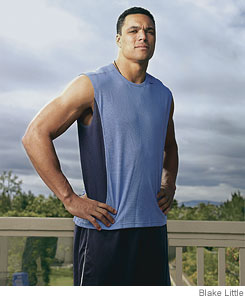January 25, 2008, - 4:36 pm
Weekend Read: Can a 247 lb. NFL Lineman Be a Vegan? (Subtitle: Vegans Are Lying)
By Debbie Schlussel
**** SCROLL DOWN FOR UPDATE ****
Lots of vegan, vegetarian, and animal rights sites around the Net are buzzing about today’s Wall Street Journal feature, “The 247 Lb. Vegan*“. They’re claiming that this article, about the diet of 247 lb. Kansas City Chiefs Tight End Tony Gonzalez, proves that an animal products-free diet is sustainable for anyone regardless of the lifestyle, physique, or profession.
But it’s a lie. There’s a reason there is an asterisk in the title of the article. Gonzalez’s diet includes 1,120 calories of broiled salmon for dinner. And according to the Vegan/PETA (a/k/a PUTAh–People for the Unethical Treatment of Animals and humans) orthodoxy, you cannot eat any animals or animal products in your diet. Um, people, salmon is a fish. It was alive. It feels pain. Forget the PETA campaign against fishing?
Oh, and then there’s the fish oil, the meat, chicken, and other fish he incorporates into his diet. THAT’S. NOT. VEGAN. Not even vegetarian.

So, the answer is no. One cannot be an NFL lineman and be a vegan. You need animal protein to maintain the weight. And looking at the photo of Gonzalez, he looks on the small and thin side for an NFL lineman. He’d probably be much bigger and stronge–a prized advantage in an NFL line–if he ate meat and protein and drank cow’s or goat’s milk. Let’s see how he does, next season. And by the way, when he first started “veganism,” Gonzalez had serious workout problems, and even his vegan nutritionist told him to take fish oil. Guess where that comes from? Hint: an animal that once lived. That’s anti-vegan.
Veganism doesn’t help athletes, and that’s why Gonzalez’s diet isn’t vegan:
There’s no evidence a vegan diet can improve an athlete’s performance, says David Nieman, a professor of health and exercise at Appalachian State University. His 1988 study of vegetarian runners found they ran as well as their meat-eating rivals but no better. Although the vegetarian athletes in his study also ate eggs and dairy foods, he says, “there is scientific evidence that veganism, when done right, won’t hurt performance.” But, he adds, there is only anecdotal evidence that it can help. . . .
Experts say athletes in training need as much as twice the protein of an average person to rebuild muscle. Their bodies also require a big dose of minerals and vitamins, as well as the amino acids, iron and creatine packed into fish, meat and dairy foods. It’s fine to be a vegan, says sports nutritionist and dietician Nancy Clark, if you’re willing to work at it. “It’s harder to get calcium, harder to get protein, harder to get Vitamin D, harder to get iron,” she says. “You have to be committed.” . . .
Mr. Gonzalez, who grew up in Southern California, says cheeseburgers were his favorite food. But he quit them, substituting fruits, nuts and vegetables. At restaurants, he ordered pasta with tomato sauce.
Three weeks later, he walked into the weight room at the Chiefs’ training facility and got a shock. The 100-pound dumbbells he used to easily throw around felt like lead weights. “I was scared out of my mind,” he says. Standing on the scale, he learned he’d lost 10 pounds.
Mr. Gonzalez considered scrapping the diet altogether and returning to the Chiefs’ standard gut-busting menu. First, though, he called Mr. Campbell, who put him in touch with Jon Hinds, himself a vegan and the former strength coach for the Los Angeles Clippers basketball team. Mr. Hinds suggested plant foods with more protein.
The Chiefs’ team nutritionist, Mitzi Dulan, a former vegetarian athlete, did not believe that was enough. With the team’s prospects and Mr. Gonzalez’s legacy at stake, she persuaded the tight-end to incorporate small amounts of meat into his plant diet. Just no beef, pork or shellfish, he said; only a few servings of fish and chicken a week. [DS: Um, that ain’t vegan. It’s not even vegetarian.] . . .
Mr. Hinds showed him nutritious fish oils and how to pick out breads dense with whole grains, nuts and seeds.
Once again, fish oils–NOT vegan.
Regardless, the article is an interesting read.
**** UPDATE, 01/27/08: I missed this part because it was in a caption under pics of food and drinks in Tony Gonzalez’s “Vegan” diet:
After-workout recovery drink: Mr. Gonzalez drinks Accelerade, a mix of carbohydrates and protein. Though accelerade uses animal protein, Mr. Gonzalez says he doesn’t mind because it helps his muscles recover from his workout.
(Emphasis added.)
Um, animal protein? NOT VEGAN. Answer: No a 247 lb. NFL Lineman CANNOT Be a Vegan.
Tags: animal products, Appalachian State University, athlete, Campbell, Chiefs' training facility, coach, David Nieman, Debbie Schlussel, favorite food, fish oil, food, Jon Hinds, Kansas City Chiefs, lineman, Los Angeles Clippers, Mitzi Dulan, Nancy Clark, National Football League, NFL, pain, professor of health, professor of health and exercise, sports nutritionist and dietician, team nutritionist, Tony Gonzalez, vegan diet, vegan nutritionist, vegetarian athlete, Vitamin D, Wall Street Journal


He’s really more of a very big wide receiver. But the point is true. It would be very difficult to maintain his muscle mass on a purely vegan diet. Unless, of course, he’s been visiting with Stallone.
Blayne on January 25, 2008 at 5:12 pm